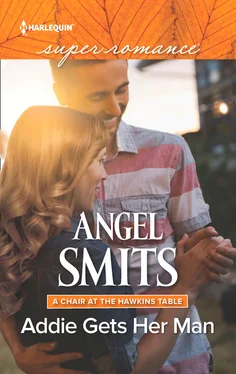“No, thanks. I already have a cup of tea that’s probably half-cold by now.” She took another step, then paused and glanced over her shoulder at him. “But if you’d like some conversation—”
“I would.” He pulled the chair out that she’d been sitting on. Not sure if it was because of how she moved, or the closeness of where he stood to her, but a soft whisper of perfume pleasantly startled him. The long hair that had tumbled over Addie’s shoulder while she read brushed his arm.
So soft. He shivered.
For the first time since he’d moved here, since Carolyn’s death, he didn’t feel quite so alone.
* * *
ADDIE USED TO come to the coffee shop when the hours of taking care of Mom had been too long. Now she used it as a transition. The full day of kids and constant activity at school was too drastically different from her quiet home. She came here and read—then she could face the silence.
Growing up in a houseful of kids hadn’t prepared her for being alone very well.
“You live near here, right?” she asked Marcus as she moved her book bag and purse to his table. The table was small, and while he wasn’t as tall or as muscular as her brothers, he managed to take up more than enough space in the room.
“A few blocks. You?”
“Yeah, it’s just a short walk over that way. Do you come here often?”
He smiled, and she realized he’d caught her unintended use of a pickup line. Her cheeks warmed, and she ducked her head, hoping he didn’t notice.
He must have taken pity on her. “Sometimes. It’s a nice break.”
“From?”
“A thirteen-year-old boy.” He took a sip of his coffee before saying anymore. “I often wonder if I was like him at that age.”
“You could ask your mother.” She took a sip of her now-cooled drink. Lovely.
“Uh, no.” His smile dimmed. “Mom’s not exactly the reminiscing kind.”
Addie tilted her head just a bit, wondering about him. “She’s not?”
“No. She’ll gladly tell you how much money they raised for diabetes research in 1989, but she couldn’t tell you what I did for my birthday that year.”
“Sounds like a woman who believes in helping people.”
He frowned. “I’d say she’s more interested in the disease of the week and who’s the keynote speaker at the fundraiser.” He shook his head. “I’m sorry. That didn’t sound very charitable. She found her way to cope with being alone so much.”
She couldn’t help but wonder what he meant by all that. She wanted to ask, but if she’d learned anything being a teacher, it was patience.
“Every family has its issues.”
“Issues. That’s a nice way to put it.”
“Hey, I’m not pointing any fingers. I have five siblings and there’re plenty of stories, believe me.”
“Five. That’s...incredible. Your parents must have been saints or crazy. Ryan is enough challenge for me.”
She laughed. “A bit of both, I think.” She stared into her tea. Her voice broke. “I keep thinking I should be over the grief by now.”
The silence stretched. “I don’t know if it ever goes away.”
The pain in his eyes reminded her of his wife. What had she been thinking? What was wrong with her? She needed to shake this funk. “I’m sorry.” She put her hand on his. “I didn’t mean to remind you—”
“It’s okay. I’m used to it.”
“You get used to it, really?” His skin was warm under her palm. It felt good to touch him, too good. She pulled her hand away and he let her, though he watched her movements.
Their gazes met. His eyes were a bright, rich blue, a contrast to his dark hair. What was he thinking? About his wife? About his son? About the book that he’d yet to open? About her?
“I really should get home.” She stood and hastily gathered her things. “Tomorrow’s an early day.”
“Yeah. I should get going, too. Early class, as well.”
“Class?”
He shoved the still-unopened book into the backpack. “I teach at the university.”
“I didn’t realize I was with a fellow educator.” She liked knowing she had that connection with him. “What subject?”
“History. Military history, specifically.”
“Really?” Why did that surprise her? Then she remembered the book he’d been reading. “So, the book—” she tilted her head toward the backpack “—that’s for class?”
He shouldered the pack. “I don’t know yet. Maybe later. Right now, it’s...personal.”
They headed toward the door, and she expected him to turn in the opposite direction. Instead, he fell into step beside her. “Do you live this way?”
“Uh, yeah.” He stopped and, with a self-deprecating smile, gestured for her to precede him down the walk. “I guess we’re headed the same way. You don’t mind, do you?”
“No. I—” What were the odds? It was a small community, one of the carefully planned midcentury communities. Both from small towns, her parents had specifically chosen to live and raise their family here for that reason.
“What made you decide to move here?” she asked before she had time to think and stop herself.
“Actually, it was Ryan’s idea.” He walked on the outside of the sidewalk and didn’t speak again until they’d reached the corner. “After Carolyn’s death, both of us needed a change. We wanted out of Chicago.”
“Is that where you were raised?”
“Yeah.” This time he tilted his head and looked at her, smiling. “You ask a lot of questions.”
“Occupational hazard. Sorry.” She felt her cheeks warm again. “You don’t have to answer.”
“No, it’s no problem. Yeah, I grew up in Chicago. We lived in an apartment on Lake Shore Drive.”
“Not in a house?” Why did that seem so strange to her? She thought of the big house where she’d lived with her family, and the big ranch where Wyatt now lived that had belonged to her grandparents. An apartment would have been so strange.
“Dad was gone most of the time.” He said that through clenched teeth. “So, Mom was a single parent in reality. It was just me and my sister. An apartment made more sense.” He shrugged again, and his eyes grew distant.
What was he seeing inside his mind? She wanted to ask, but refrained from uttering another question.
The sun was setting, and the shadows reached out. At the next corner, they both turned left. “Go ahead. I know you want to ask.”
This time she laughed. “Am I that easy to read?”
“Yes, and no. Remember, I’m a teacher, too. It’s in our nature to see the ones who want to ask but won’t.”
“True. Okay, so why was your dad gone so much? What did he do?”
“I’m not totally sure.” He kept walking for a good half a block. “He was career military, and even after his official retirement, he still contracts with them.”
“That must have been rough.”
“We weren’t used to him being around.” He shrugged. “When he came home, it was worse than when he was gone.” Again, he looked at the horizon—watching the clouds? Or his memories?
“I’d have loved to have more time with my dad,” she whispered.
“I’m sorry. Tonight wasn’t very upbeat.” Marcus rubbed the back of his neck in a nervous gesture. He lifted the shoulder that had the backpack on it. “I think this book is influencing my mood.”
They’d reached her house, and she paused at the end of her walk, just outside the white picket fence that had attracted her to the house in the first place. “This is it.” She waved at the house, then faced him. “It was a lovely evening. Really.” She meant it. He seemed honest and sincere. She liked that. She hadn’t found those qualities in many of the men she’d met in the past few years. “Thank you for sharing with me.” She paused, then grinned at him. “And for walking me home. I don’t think anyone’s done that since I was, like, fourteen.”
Читать дальше












